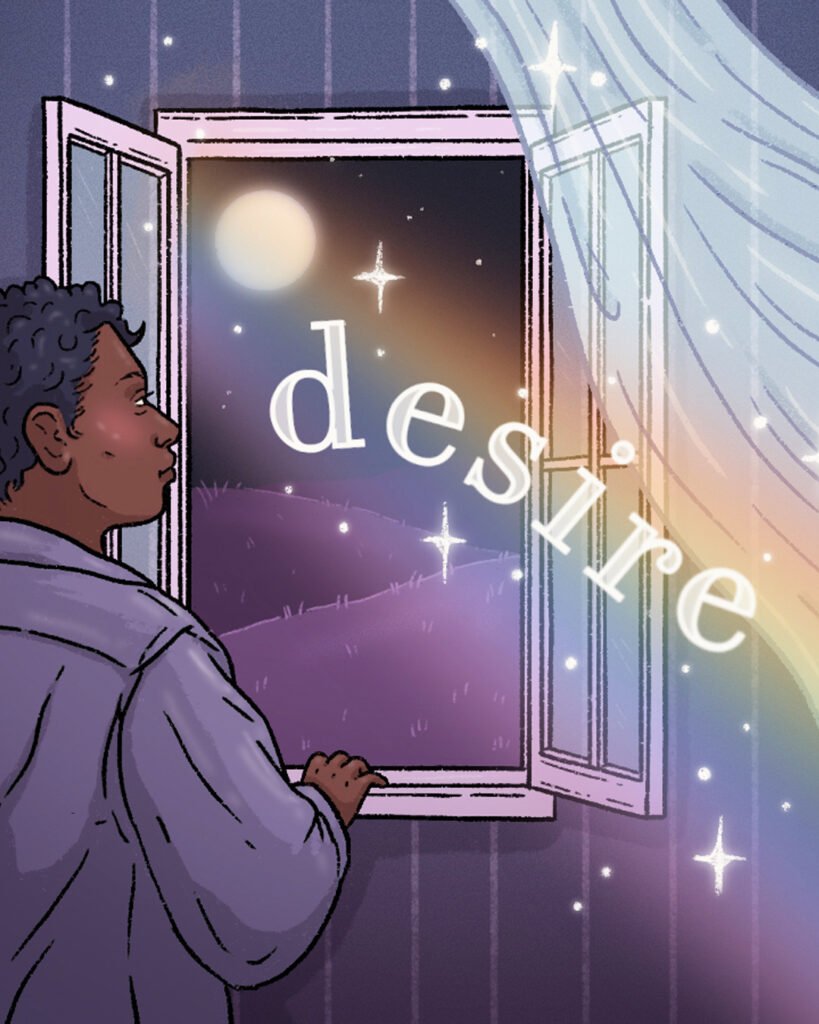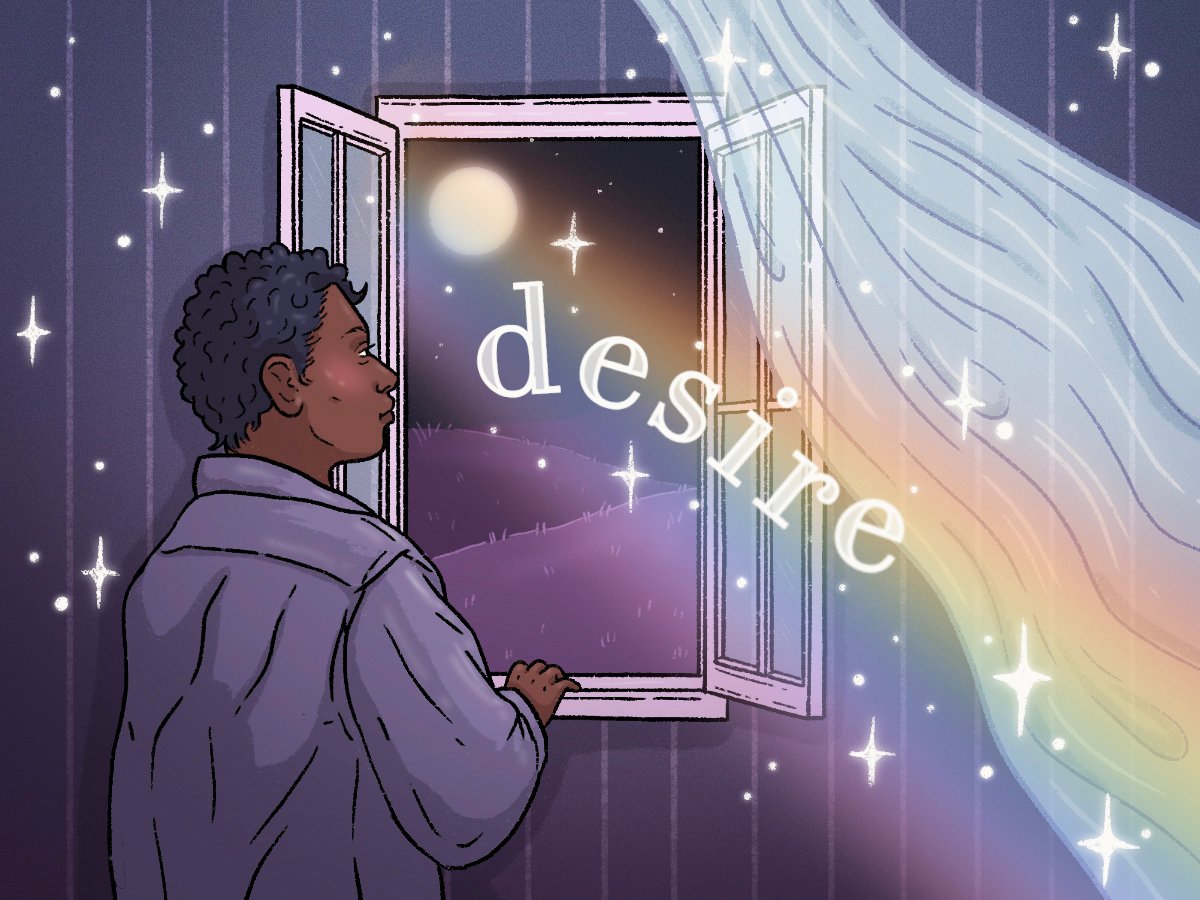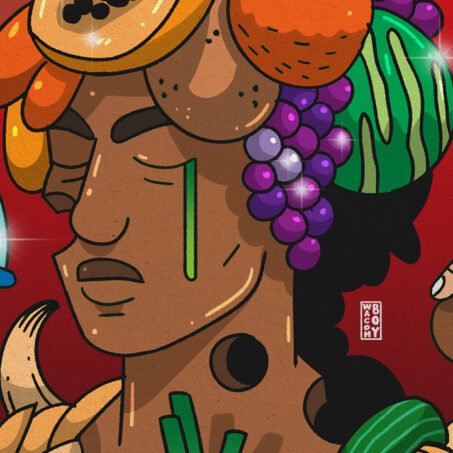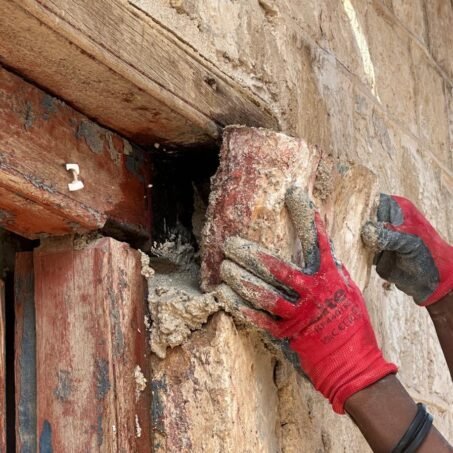Desire is a sticky maze where the malleable dreams of my child self and the current version of me who grapples with adult life meet. All this to say: desire is very fucking personal. It is so personal that I am often struck by the secrets my desires reveal to me about the architecture of my subconscious world. The stories I have internalised about beauty, worth, success, sex, love and power are the stories I look for in my material reality. The two are magnets – always looking for each other yet shadowed in a kind of secrecy.
I’ve been toying with new language to describe this hushed curiosity. In some ways, there is unbridled joy in being able to satisfy every “why” in this conversation. However, the older I get, the more I learn that much of what I once desired was at some point inherited. This arena feels like a symphony of whispers because it is the legacies of foreign systems that have shaped the desires I grew up nurturing. Unknowingly, I have been walking around with borrowed fantasies. And that leads me here, to this essay. I may not fully map the ‘why’ of my landscape of desire, but I can begin to unmask it.
Uncoding desire
What shapes our desire?
Is it an intuitive voice that sits at the very core of who we are? It is a quiet nudging towards a universal truth? I like to think of desire as a spectrum – a prism through which the light of our mosaic existence shines. We are the sum of many parts. We are making and unmaking ourselves as the experiential meets us along the way.
What remains true is the ancient mystery of desire as a guiding force of the human experience. It is a phenomenon that does not fall neatly into the bounds of a single definition or a single story. Desire is as nebulous as it is dynamic. It shifts. It responds. It challenges. It confronts.
Do you know why you want the things you want? Are you in active conversation with your desire? I’ve been thinking about this a lot recently. The other day I posted a WhatsApp story that reads: “Sincerely, you do not need to ask ChatGPT what you want to eat for dinner. You can actually ask yourself. Your own desires are within reach!”
I love the unbridled wisdom of a WhatsApp story posted on a random Thursday. “Where are all the thinkers?” FKA Twigs once asked. Well, they’re providing critical thought in their WhatsApp stories. Anyway, I posted that story because I have grown deeply weary of our culture of convenience, which I think is one of capitalism’s most insidious ways of detaching us from our desires.
This is because our instincts and problem-solving skills all bear an essential relationship to the worlds we are able to build. Our innate curiosity is rendered a waste when we don’t actively engage it. We rely on all these tools to help us do things that we have always been capable of doing ourselves. We ask a chatbot what we want, what we like, and who we are. We are mirroring and reinforcing the manufactured mistrust in our own capabilities.
Towards unrooting the self
The project of colonialism committed an assault on desire that set the stage for the suffocating of curiosity. We are living within the belly of this frustrating legacy. Desire is knowing that there is more. It is not just about sexual want. It is a pull towards what is truthful, what is freeing and what colours our lives with joy. For Indigenous communities in the Global South, desire has always been a threat to the powers of hegemony.
In María Lugones’ Heterosexualism and the Colonial / Modern Gender System, she speaks about how colonialism violently imposed a rigid gender binary and heterosexual normativity where many precolonial societies recognised more fluid, relational, and communal understandings of embodiment and desire. The writer argues that this “colonial/modern gender system” was not merely about categorising people by sex, but about reorganising entire worlds of intimacy, reproduction and kinship so that desire could be policed and folded into racial, patriarchal and capitalist hierarchies.
If a people are connected to the roots of their desire, they are also connected to their innate power. You cannot manipulate or steal from a society built on sacred desire (a form of longing understood not as individual possession but as a collective, reciprocal force that binds people to each other, to the land, and to the divine). You cannot poke holes in the collective consciousness of a people who are in deep conversation with their divinity and their knowing.
What you can do is attack the imagination of a people. The imagination of colonialism is a vacant desert – marred by scarcity and buoyed by an insistent violence that binds us to hierarchical orders. This is evident in the language and ideas that colonial powers imposed: Africa cast as the “dark continent,” the West elevated as the pinnacle of morality, possibility, and progress. These narratives are specific to colonial thought, and their roots are now widely recognised as deeply racist.
Today, we see echoes of this imagination in new forms: the persecution of migrants, the demonisation of the “other,” the normalization of white supremacist rhetoric on a global scale. While the context has shifted, the effect is similar – these ideas constrict our collective capacity for possibility, bending societies to hierarchical and exclusionary logics unless we actively resist them.
The uses of the erotic
A few weeks ago, I returned to Audre Lorde’s “Uses of the Erotic.” While reading, I felt every word move through me, so much so that I needed to take breaks, snap my fingers, scream internally, go back and highlight certain sections, and let myself get emotional.
No matter how many times my body meets the words of this text, I am moved when I allow myself to sit with it in full. This moment was soundtracked by Kelela’s Raven. The two works – both sensual, queer, Black and rooted in a deeply radical femininity, danced in a triumphant conversation. The music landed in my body in a similar way to the text – both layering and undressing my capacity to embody the very core of their message. This moment culminated as a banquet for my brain and body.
What, according to Audre Lorde, is eroticism? She describes it as “a resource within each of us that lies in a deeply female and spiritual plane, firmly rooted in the power of our unexpressed or unrecognised feeling”. For Lorde, the erotic is not limited to sexuality but is a profound source of knowledge, joy, and connection that can reshape how we engage with ourselves and the world. This very much echoes the concepts of Indigenous eroticism and sacred desire, where feeling itself becomes a guide and a form of wisdom. It is from this understanding that I locate the erotic in my own life.
For me, this energy shows up like a crush – a delicious, gravitational pull towards something, a sense of openness that makes me feel utterly alive, and signals where I am meant to go. ‘Feeling’ is not posited as a frivolous, futile concept. It is a no-holds-barred confrontation with power. It is the fuel that ignites systemic, personal and communal transformation. The erotic is dangerous to those who seek to render it useless.
Feeling fully, refusing reduction
When I need to cry, I let myself lean in, feeling that sense of ease and release that I instantly recognise as freeing. And from that place comes the pleasure of being so alive that nothing about my embodiment of feeling could ever be bad, shameful or wrong. Similarly, when I recognise how the world reduces my body to an object – for cis-hetero male scrutiny, pleasure, consumption, or sometimes disapproval – I access the rage and refusal necessary to set myself free. Again and again
From this place of bodily truth – in crying, in pleasure, in rage – I see how ignoring the erotic produces shame. Audre Lorde says it best: “the erotic offers a well of replenishing and provocative force to the woman who does not fear its revelation, nor succumb to the belief that sensation is enough.” There is no losing. No need for shame. There is only honesty, a deep sensual surrender to the human and the divine, and the reminder that the two were never separate.
The erotic, in this sense, calls for wholeness (not perfection), a profound alignment with self that is, to me, another way of naming the truth. I know my writing is whole when I believe it, when I am moved by its striking ability to cut through what is merely performative and speak my heartbeat for me. I know a poem is whole when I cannot imagine capturing the intimacy of that moment better. I know an outfit is whole when I look at myself in the mirror and I feel like exactly the person I am. I know a song is whole when I feel a divine shift, an opening, a knowing when I listen to it.

Join our mailing list
Sign up for shado's picks of the week! Dropping in your inbox every Friday, we share news from inside shado + out, plus job listings, event recommendations and actions ✊
Sign up for shado's picks of the week! Dropping in your inbox every Friday, we share news from inside shado + out, plus job listings, event recommendations and actions ✊
When I feel the truth of a moment – a conversation, a reckoning with the depth of being, a deep breath in the midst of a day with teeth – I know I can relax the muscle that pretends I am the smallest version of myself. That permission to be here is the essence of the erotic, and the fuel of my desire. It doesn’t come from competitiveness, violence or shame. It is an inherent act of love to be present. And it requires such a profound sense of commitment and discipline. Lorde describes it as loving our work “even at its most difficult”. The truth is difficult and achy and devastating sometimes. It is an act of devotion to let all of that be felt and transmitted back into the love that bore it.
I realised that Audre Lorde’s work, and certainly the works that she’s inspired, have been a cornerstone of my value system for years. Her offerings have equipped me with new insight to develop some of the language I use to describe how I move through this world. How wonderful it is to have lighthouses that offer us the tools to sharpen our own clarity. I value the sensual, embodied truth of living. Aliveness, to me, is a window into the truth. We cannot tell a lie when every part of our being is felt. The truth is a language of enactment, of doing and being. Entire systems are erected and vaporised on the backs of a collective truth.
The return
What does it mean to decolonise desire, not only in terms of who we want, but how we want?
It means being honest enough to name where it hurts, name what we feel and demand something different. It means acknowledging the theft of our imagination. Standards have been created to uphold this theft (beauty standards including fatphobia, ableism, colourism, transphobia, homophobia).
What I learned about pleasure from a very young age:
Like many of us, we were handed ideals about what our relationship to desire and pleasure ought to be. I was taught that the root of my desire and pleasure is evil. Pleasure itself is evil, wasteful, destructive. That there is no healing or teaching power in accessing these things. In fact, wanting these things makes me lazy, sleazy, and sinful.
See how the imagination is hijacked? Where curiosity may guide us to further self and group awareness, shame keeps us stuck, afraid and cynical.
What my desire has been teaching me lately:
I am one whimsical ass bitch. Cynicism, overthinking, rigidity – I just don’t have the patience anymore. Of course, these modes of being arrive from time to time as a trauma response, but best believe I am not fluent in the language of seriousness.
This is because I have begun to recognise how the abundance of my eroticism is starved by attachment to control, expectation, and the need to perform. When I loosen my grip on what “should” be, I allow desire, joy, and curiosity to flow freely – untamed, unjudged, unapologetic.
My body, my mind and my heart all breathe easier when I give myself permission to play, to wander, to revel in the delicious uncertainty of life. I think of my child self, an avid daydreamer. I think of daydreaming and dreaming as resistance to the flattening of desire. I have always built luscious worlds in my mind. My childhood was as whimsical as I willed it to be because my daydreams were a deep profession of the love of storytelling I learned to possess.
Creating a home out of the erotic
So, how do you invite more eroticism into your life?
I’m going to hold your hand when I say this: you need to touch some grass. Connect to the sensory. It is yours to explore. Make something with your hands. Undermine the perceived necessity for consumerism and be challenged. Breathe. Yes, that’s right. Breathe. Get acquainted with the sensations of your body. Feel your actual feelings. Embracing eroticism is not a high-level concept, alien to the demands and challenges of everyday life. It is deeply, gorgeously simple. It is a return to something sacred and ancient, not a push towards yet another outcome.
Desire frees the body. Although it is not explicitly sexual, sex is the playground where we seem to be most comfortable speaking about desire. It is the space where touch, breath, and attention converge, where curiosity guides the hands and the lips, where pleasure and vulnerability exist side by side. Sex is not just an act; it is a dialogue with your own skin, a meditation on sensation, a celebration of how fully you can inhabit your body. In its intimacy, you encounter the sweetness of being alive, the electric thrill of connection, the quiet pulse of anticipation, the joy of discovering what moves you. Erotic life is therefore a daily practice, a way of reclaiming your senses from the demands of a world that constantly tells you to look away.
What can you do?
- Read Audre Lorde’s Uses of the Erotic in full
- Engage with Esther Perel’s work on Reconnecting to the Erotic Self
- Touch grass. Seriously
- Read this article by Ev’Yan Whitney on sexual self-care




